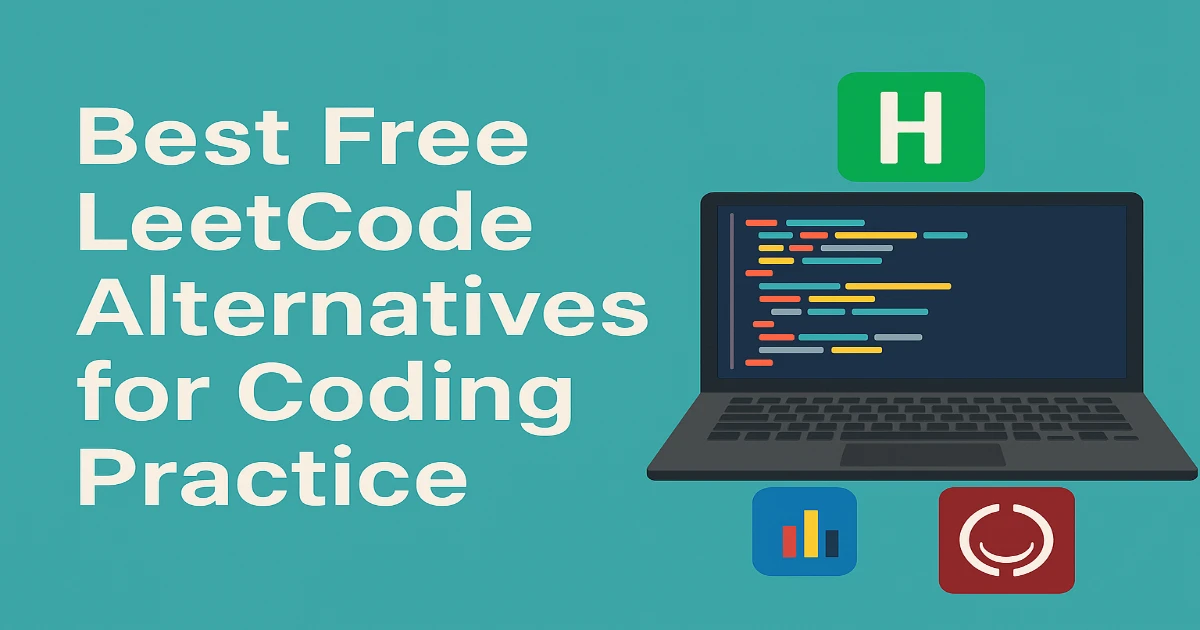In today’s competitive tech job market, practising coding problems on platforms like LeetCode is common – but LeetCode Premium can be expensive. Fortunately, many free alternatives exist for engineers around the world (from San Francisco and London to Bangalore and Mumbai) to sharpen their algorithm, data structures, and interview skills. These free sites cover a wide range of problems, languages, and domains. For example, HackerRank offers hundreds of challenges across algorithms, SQL, AI, and more; GeeksforGeeks Practice provides a “vast collection of coding problems spanning multiple topics and difficulty levels”; and CodeChef runs free monthly contests and tutorials that help beginners build skills. Together, such platforms make coding practice accessible even if you can’t pay for premium services.
Top Free Coding Challenge Websites
Many sites offer LeetCode-style coding problems at no charge. Key options include:
- HackerRank (Free) – A well-established coding platform with challenges in dozens of languages (C/C++, Java, Python, etc.) and domains (algorithms, data structures, AI, databases). HackerRank’s editor lets you solve problems online, view sample test cases, and even earn certifications or job interviews by solving company-sponsored challenges. It provides discussion forums and editorials for most problems. Many developers use HackerRank’s “interview prep kits” and contests to prepare for interviews.
- CodeChef (Free) – An Indian-origin platform offering thousands of problems and regular contests. CodeChef “stands out with its free coding contests held monthly”. It hosts a 10-day Long Challenge, shorter Cook-Offs, and Lunchtime contests each month, all of which are open to everyone. The site includes tutorials, editorials, and a large community of contributors. It’s especially popular among beginners and engineering students in Tier-1 tech hubs like Bangalore and Mumbai.
- Codeforces (Free) – A global competitive programming site hosting frequent timed contests (typically ~6 per month) and an active community. Each contest lets users solve several algorithmic problems in real time, often with a unique “hacking” phase where solutions can be challenged. Codeforces has “come to world acclaim for having a very active community and for issuing diverse problems, becoming one of the best coding websites”. It also maintains a huge archive of past contest problems to practice on.
- TopCoder (Free) – One of the oldest platforms for algorithmic contests. TopCoder runs weekly Single Round Matches (SRMs), monthly Marathon Matches focused on optimisation, and an annual TopCoder Open tournament. It is “among the best when it comes to coding practice sites”. TopCoder’s problems tend to be high quality and challenge optimisation and algorithm skills. There are no fees to participate – you only need to register.
- GeeksforGeeks Practice (Free) – GeeksforGeeks (GfG) offers thousands of articles and a practice portal. The GfG Practice section organises problems by topic, difficulty, and even by company. It has “company-wise” question lists to simulate interviews at Google, Amazon, Microsoft, etc.. GfG Practice boasts a “comprehensive collection of coding problems spanning multiple topics and difficulty levels”, making it useful for daily practice and targeted interview prep. Although GfG also has premium courses, its basic problem library and coding contests are free to use.
- Codewars (Free) – A gamified challenge site where users solve “kata” – coding puzzles contributed by the community. You can solve challenges directly online in many languages and then view discussions or user solutions. CodeWars “provides a large collection of coding challenges submitted and edited by their community”. As you clear kata, you “rank up” like in martial arts, making it fun and motivating. It’s a good way to practice discrete coding problems; many users cite Codewars as a free alternative to LeetCode for sharpening specific skills.
- Exercism (Free) – A mentor-driven practice site with 3,000+ exercises across 50+ languages. On Exercism, you solve problems on your local machine (using a CLI tool) and then submit solutions for human review. After submission, an experienced mentor gives feedback and helps you improve. Exercism is “completely free, operating on a not-for-profit model”, intentionally designed to make regular practice “accessible, effective, and joyful for everyone”. The one-on-one mentoring makes it unique among free resources.
- Project Euler (Free) – A collection of math-and-CS problems that emphasise mathematical reasoning. Project Euler challenges you to write a small program (often just to compute a number) to solve clever math puzzles. It is fully free and covers topics like primes, combinatorics, and number sequences. Unlike typical LeetCode algorithm problems, Euler’s puzzles are usually about deriving an efficient formula or algorithm to get an answer. It’s great for logic and math practice.
- SPOJ (Sphere Online Judge) (Free) – A massive archive of over 20,000 algorithmic problems. SPOJ allows code submissions in dozens of languages via its online editor. It also hosts its contests. However, SPOJ generally does not provide official editorials or solutions – you may need to rely on forum discussions for help. That said, SPOJ’s extensive problem set (ranging from easy to very hard) makes it a valuable free resource for long-term practice.
- freeCodeCamp (Free) – An open-source curriculum for learning web development and coding. freeCodeCamp offers thousands of interactive lessons, articles, and projects (including an HTML/CSS/JS stack and also data science certs). While not a LeetCode clone, freeCodeCamp is entirely free and has “helped more than 40,000 people get jobs as developers”. It’s an excellent place for beginners to build programming fundamentals (JavaScript, Python, SQL, etc.) before tackling LeetCode-style problems.
- CodinGame (Free) – A unique platform where you solve puzzles by writing code to control game elements. Instead of a plain text editor, you code in-game actions (e.g., moving characters, solving a maze). It supports 20+ languages. CodinGame isn’t a traditional competitive programming site, but it’s popular among those who enjoy visual or gamified coding practice. It has solo puzzle challenges and friendly multiplayer code contests.
Each of the above sites is free to use (though some offer paid certificates or premium content, and you can practice most problems at no cost). They complement or substitute for LeetCode by providing community forums, editorials, contests, and variety in problem style. In major Tier-1 tech cities (e.g. New York, San Francisco, London, Bangalore, Delhi), developers frequently leverage this ecosystem of free platforms to prep for interviews and competitive exams without subscription fees.
Competitive Programming & Contests
Beyond individual problem practice, many free sites emphasise contests and competitive coding, which can greatly improve your skills under pressure:
- Codeforces hosts bi-weekly contests and educational rounds. It’s “Contests Galore: Almost six contests each month”, including short and long formats. Codeforces’ unique hacking phase allows contestants to challenge others’ solutions, which encourages writing robust code. Practising past Codeforces contest problems is a free way to simulate intense coding interviews.
- TopCoder SRMs and Marathons – As mentioned, TopCoder runs weekly SRMs and monthly Marathons. Users can view problem statements from past contests and submit practice solutions. The marathon (optimisation) problems can be tackled on your own time. All TopCoder resources are free to access once you have an account.
- ICPC (International Collegiate Programming Contest) – Not a website, but worth noting: local ICPC-like contests (often organised by universities or ACM chapters) provide free experience in team coding contests. Many online judges (e.g. Codeforces, UVA) host ICPC-format problems. Participating or practising on archived ICPC problems (World Finals or Regional contests) is a free way to challenge your skills.
- Google Code Jam and Facebook Hacker Cup archives – Major tech companies often publish past contest problems (with solutions) on their sites. For example, Code Jam and Kick Start problems are accessible after the contest. These are free to practice on your own and mirror real company interview questions.
By regularly participating in such contests (all free), you build algorithmic speed and learn new tricks. Many coders in cities like San Jose and Bangalore form local study groups or competitive programming meetups to tackle these free contests together.
Interview Prep & Mock Interview Resources
Besides pure coding challenges, there are free resources specifically tailored to technical interviews:
- Pramp / Exponent Practice (Free) – Pramp is a free mock interview platform where you practice one-on-one with a peer. (As of 2024, it’s merged with Exponent Practice.) You select interview topics (like algorithms or system design), and Pramp pairs you with another user. Each session is 30–45 minutes of live coding over a collaborative editor, followed by feedback. The service advertises that it provides “complete tech interview practice… for free”. Thousands of developers report that Pramp sessions helped them gain confidence in real interviews.
- Interviewing.io (Free demos) – Interviewing.io allows users to practice live, anonymous interviews. While full participation may require earning spots, the site offers free recorded mock interview replays conducted by engineers from Google, Facebook, etc. Reading or watching these interview replays (all freely accessible) can teach you common problems and interviewer techniques. In summary, with a bit of luck, you can get some live interview practice for free on this platform, and you can always watch others’ interviews.
- Geek for Geeks Interview Corner – GFG has an “Interview Corner” that lists top interview questions and company-specific Q&As. While their practice portal was covered above, GeekforGeeks also compiles user-contributed interview experiences and typical questions. Browsing these (along with the free practice problems) helps simulate real interview preparation.
- Mock Interview Books & Courses (Free content) – Many authors have published free interview question lists (e.g. “300 Coding Interview Questions”) as blog posts or PDFs. Sites like GeeksforGeeks often release free ebooks or playlists for interview prep.. (For instance, free resources on Array, Tree, and DP topics are widely shared in tech communities.) While not “platforms,” these collections are part of the free ecosystem.
- Coding Interview Communities – Places like StackOverflow, Reddit (r/cscareerquestions, r/leetcode, r/learnprogramming), and even Discord study groups are free forums where people share problems and mock interview opportunities. Engaging in these communities can connect you with free peer interviewing and discussion about LeetCode-style questions.
Data Science & Specialised Problem Sites
Some free platforms focus on data, ML or special problem domains:
- Project Euler (again) – Mentioned above, great for math and logic puzzles with a programming twist. Completely free.
- Kaggle (Mostly Free) – A data science competition platform. Kaggle hosts free datasets and challenges (often team-based) in machine learning and analytics. While not typical coding puzzles, Kaggle kernels and competitions sharpen programming, statistics, and problem-solving skills for data-focused interviews. It’s a free, alternative route for data engineering or data science interview prep.
- StrataScratch – A site offering free SQL and Python exercises drawn from real interview questions at top companies. (It has free question bundles, though advanced content may be paid.) It’s an example of niche-free content – practising on past company interview problems for data roles.
- LeetCode Discuss and Blog – While LeetCode’s company-tag features are mostly premium, its free Discuss forum has community solutions and tips on problems (including many premium ones). Searching “LeetCode problem solution” on Google often leads to free blog posts or GitHub answers posted by other users.
- GitHub Resources (Free) – Numerous public repositories collate interview questions and solutions. For instance, awesome-leetcode-resources (ashishps1/awesome-leetcode-resources) is a famous free list linking to DSA tutorials, code examples, and problem sets. Other repos like “LeetCode-Top-Interview,” “Coding Interview University,” or “NeetCode 150 solutions” are free community contributions. Browsing these GitHub collections can give you thousands of solved problems and study plans at no cost (though be careful not to plagiarise if you cite them).
HackerRank vs LeetCode vs Other Free Sites
A common question is how HackerRank or CodeSignal compare to LeetCode, or whether sites like CodeWars can replace LeetCode:
- HackerRank vs LeetCode: HackerRank is completely free and covers a broader range of topics (including SQL, AI, databases, etc.). It is often praised for having an easy UI and many tutorials. LeetCode, in contrast, has a very large problem bank specifically tailored for technical interviews. Its free tier is limited to most problems, with company-specific filters locked behind Premium. In practice, many candidates use HackerRank for initial practice (it’s used by some companies for screening) and LeetCode for targeted interview prep. Because LeetCode’s premium content is paid, it’s advisable to also solve similar problems on free platforms.
- Codewars vs LeetCode: Codewars is a fun, community-driven alternative. It focuses on kata challenges that are often shorter or more puzzle-like than typical LeetCode questions. Many find CodeWars useful for practising specific coding patterns and edge cases. It lacks a company interview context, but is good for engagingly sharpening syntax and algorithms. So yes, Codewars is a good free complement to LeetCode – especially to build fluency – but for mock interviews, you’d still want more LeetCode-style tasks.
- CodeSignal vs LeetCode: CodeSignal (formerly CodeFights) offers timed coding tests and standardised scoring. It has a free tier with many practice problems and interview games. Its focus is on coding assessments that some companies use. While CodeSignal has paid certifications, its free problems and arcade mode are widely accessible. Like HackerRank, it can stand in for LeetCode as a practice tool, especially if you want to simulate an assessment format.
- Exercism vs LeetCode: Exercism is very different from LeetCode. Instead of solving immediately online, you submit code for mentor feedback. It is excellent if you want guided learning in a language. It won’t give you the same volume of random problems, but it does provide deep feedback, which LeetCode’s free version does not.
- Project Euler vs LeetCode: Project Euler’s problems are often more math-oriented. If you enjoy number theory and combinatorics puzzles, Euler is a free training in logical thinking. LeetCode’s problems are more practical (arrays, strings, dynamic programming, etc.). You can use both: Euler for sharpening mathematical insight, and other sites (e.g. GfG, SPOJ) for typical DSA problems.
Overall, no single free platform matches every LeetCode feature, but between them, you can get very close. For example, GeeksforGeeks covers interview logic and company-specific questions for free, while HackerRank and CodeSignal give you automated scoring and badges. Codeforces and TopCoder train you for competitive algorithmic thinking. Using a mix of these free sites can replicate almost all of LeetCode’s benefits without paying.
Studying Without LeetCode Premium (or Getting It Cheap)
Many candidates wonder if they can get premium features for free or find a “cheapest” way to access them. Circumventing payment is not legal or ethical, so we don’t endorse any hacking or piracy. Instead, the best “free” strategy is simply to rely on the alternatives above. In practice:
- Use free sites instead: Focus on mastering problems on HackerRank, CodeChef, GfG, etc., instead of paying for LeetCode Premium. These sites cover most core topics for interviews.
- Leverage trial and student offers: Occasionally, LeetCode offers free trials or student discounts. If you are a student, check if your institution provides access. However, promotional offers come and go.
- Community-shared resources: As noted, many solutions and company-question lists are available freely online (e.g. GitHub repositories or YouTube channels like NeetCode). Studying these can substitute for premium content.
- Practice mock interviews: Spend your time doing live interviews (Pramp, peers, etc.) rather than seeking additional locked problems. Real-time practice can be more valuable than one extra problem set.
In short, you can effectively prepare for coding interviews without LeetCode Premium by using the wealth of free resources listed here. This approach is ethical and often more comprehensive in the long run.
Conclusion
LeetCode is a powerful tool, but it’s not the only game in town – especially if you’re looking to save money. Free alternatives abound: from general coding sites like HackerRank and freeCodeCamp, to competitive contest sites like Codeforces and TopCoder, to learning platforms like Codewars and Exercism. These platforms offer coding problems, tutorials, contests, and interview preparation content at no cost. Tier-1 city tech hubs around the world (New York, London, Bangalore, etc.) see thousands of developers using these free platforms daily. In practice, mixing and matching these resources often gives learners as much practice as LeetCode provides. By exploring this variety of free platforms, any software engineer can master data structures and algorithms, practice mock interviews, and build confidence — all without spending a dime.
FAQs
1. What are the best free LeetCode alternatives for coding practice?
There are several top platforms similar to LeetCode but free to use. Some of the best include HackerRank, Codeforces, CodeChef, GeeksforGeeks Practice, and Codewars. Each offers hundreds to thousands of problems across various domains like algorithms, data structures, and SQL, making them ideal for free coding practice.
2. How can I prepare for coding interviews without LeetCode Premium?
You can prepare effectively by using free competitive programming websites for interviews like GeeksforGeeks (company-wise questions), CodeSignal (mock assessments), and Pramp (live peer interviews). Additionally, many GitHub repos offer free LeetCode-style solutions and interview question roadmaps.
3. Is Codewars a good free alternative to LeetCode?
Yes, CodeWars is a great platform offering free coding challenges for software engineers. It’s especially useful for practising syntax, patterns, and edge cases in multiple programming languages. While it doesn’t focus on company-specific questions, it helps sharpen core logic skills.
4. Where can I find free places to solve data structures and algorithms questions?
You can solve DSA questions for free on HackerRank, CodeChef, SPOJ, and Project Euler. These platforms provide structured problem sets on arrays, trees, graphs, dynamic programming, and more—ideal for practising coding for free like LeetCode.
5. What’s the cheapest way to access LeetCode Premium features or simulate them?
The cheapest way to get LeetCode Premium features for free is to use a combination of other platforms that offer similar problem types. Use Codeforces for timed contests, GFG for company-wise prep, and GitHub repos for Premium-style problems. Watching free mock interview replays on Interviewing.io is also highly effective.













Solid article. No fluff, just value.